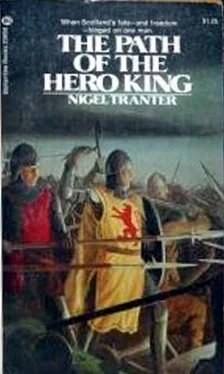Less than convinced, Hay bowed.
At last, that evening, the feast given by the Guilds of Aberdeen for
the monarch and Council over, Robert Bruce had privacy to draw from his
doublet the unopened letter which had been contained within the other
sent by William Lamberton, Even the sight of the strong and somewhat
carelessly formed handwriting set his heart stirring. Feasting, drinking and dancing still went on below, and would for hours yet, if he knew his brother Edward; but he had managed to slip away, he hoped scarcely noticed, leaving the same Edward cavorting with a Christina who was at some small pains to show her liege lord a certain coolness. That suited the King well enough this night. He was as fond of gaiety as any-he had been accounted too gay, once-and had been starved of it, like the others, for too long; but that crushed unopened letter had lain over his heart for long hours, setting up its own vibrations within him.
Now, in his own bedchamber, he broke the seals.
He read:
My loved lord and dear husband.
I have written you many letters these weary months, for my own hearts ease only, knowing they could not come to you. And so burned them in the fire, that in their very smoke some small waft of their love and aching might sail on an air kinder than men north and north over the long leagues to Scotland and my dear. Foolish woman that I am.
But now, I write in sudden gladness, so that I can scarce hold this quill from trembling, and you may scarce be able to read these feeble words for splutters of ink and tear-drops- I who am no weeper, as you know. Fool, indeed. But these are tears of joy, my sweet, in that at last I may write in the hope that you may read.
For Bishop Lamberton is come to me, the first friends face I have seen in more than a year. Who says that he has means to carry a letter to you secretly. I thank God for it.
I thank God also, Robert, for the tidings the Bishop gives me of you. Hereto they have told me only that you are a hunted outlaw, a murderer, a slayer of the innocent, harried and driven. Or else that you are fled the country, gone beyond the seas, in Ireland or Norway. Yet since you cannot be both, in truth, I have taken heart from their lies. And know at least that you were alive, and a trouble to these my captors.
Now, the saints be praised, I learn that you are indeed still your own true man, and mine, a scourge to your enemies, winning victories and waging war for your kingdom. So prayers are answered after all, and I rejoice.
I am held close prisoner here, but you must not deem me illused or woeful. I see no friendly faces, and live the plainest. But I have a garden to walk in and dwell, I swear, a deal more comfortably than does my lord. None treat me as Queen, but at least I am the Earl of Ulsters daughter. When I hear of what is done to the other women of our company, and to your poor daughter Marjory, I could hate my own betterment. But Robert, how I do long for you.
Estate, and bodily wellbeing, these matter less than nothing when I have not you in company. Would that you had heeded me in Strathfillan, and allowed that I remain with you. No privations and wanderings and dangers, at your side, could have matched the sorrows of this long separation.
I heard, my dear, what King Edward, the old Edward, did to your brothers. To the gallant Nigel, and to Thomas and Alex. As to Christopher Seton. My heart bleeds for you. I pray nightly for the souls of them, as for the damnation in hell of he who did these monstrous things. It is almost beyond belief that a man could be so vile. Yet I thought not ill of my God-sire once. I believe that only a sickness of the mind could have served for this.
Who knows how the new King will deal with us. He is much other to his father and a lesser man in most things, I am sure. But I do not believe that he will relent in any degree towards Scotland or to yourself. And therefore to me. So I do not deceive myself that he will let me return to you, save you make him. And God knows how that is to be done, for I do not. Although I pray for it unceasingly.
The Bishop, it is clear, thinks as I do, and he knows this King better than do we. Robert, my good Robert-how in Christs sweet name are we to come together again?
Ah, forgive me, my brave lord, that I should write so. It is no wifes part to assail your eyes and ears with my womans wails.
Indeed, the fact that I can be no wife to you is the worst of me. For my body, as my mind and heart, does long for you. And you know that I am near as lusty of temper as you are. You wed no modest, gentle milk-white Queen, my lord King, no meek sufferer, so that sometimes I do fear for my reason … These last sentences had been scored through with a spluttering pen, but were readable enough. And eloquent.
Heed me not, Robert. This is not my true self that writes so. I am but carried away by this so unexpected link with you. Somehow you have of a sudden seemed to come very close, so that I feel I must needs grasp out at you, to hold you, keep you, lest you go from me again. When indeed all there is, out there, is a patient Bishop waiting for this foolish paper. But it is too late to write another, better letter now. I have kept your friend waiting too long already.
Here is the truth of it, Robert. I need you. I miss you beyond all
telling. But I can wait. Oh yes, I can wait, never fear. One day,
God willing, I will be wife to you again. But meantime, my love, I
know your mans need. I know you to be a hot man. Meet your need for
women as best you may, Robert. I wed you knowing that need. But of a
mercy do not tell me of it. I am foolish. You have my understanding
in this. But scarce my blessing. Take who you will my, Robert-but oh
my heart, love only your
ELIZABETH
That last line and signature was scarcely decipherable, a straggling scrawl, blotted and tailing away. The reading of it brought quick tears to the mans own eyes.
Long Bruce sat, on the sub-Priors bed, with that letter in clenched hand, motionless, though sometimes his lips moved, and once or twice he groaned a little. From below, the sound of music and revelry rose faintly-strange sounds from a monastery.
Then he stiffened as another sound came close. There was a brief knock at the door, and Christina MacRuarie opened it. She stood there slightly flushed but looking very handsome.
The King looked at her, but scarcely saw her.
You read your letter again, rather than dance? Or even sleep?
she demanded.
Are bishops letters so much to your taste?
It is from my wife, he said slowly.
Elizabeth.
Oh, She stared, biting her red lip.
Your pardon. She … the Queen? She is well?
He inclined his head.
Then, Sire, I think … that you will not be requiring me? This night?
I thank you-no, he said.
A … a goodnight to you, Christina.
She shook her head, and in those darkly vivid eyes was a strange expression, compounded of pain and pity, regret and a deep understanding.
And something more. Without a word she turned and left him there.
Chapter Thirteen
The singers voice rose strong, clear, tuneful, yet with a haunting sadness, to pause on a rising, questioning note that was at once and strangely both plaintive and challenging, a note that was allowed to die away into the blue hush of the night and merge with the lap lap of the wavelets on the loch shore and the sigh of air in the scattered Scots pines whose sturdy gnarled trunks redly reflected the glow of the camp-fires. Quivering, the composite liquid sound seemed to soar away over heather and water, for long breathless moments before the tremendous, fiercely positive refrain crashed out again from a thousand throats, yet in perfect unison and unbroken melody. Robert Bruce shivered, though not with cold, as his mothers Celtic blood responded to the ancient magic of it, even though he understood only a little of the distinctively West Highland Gaelic of the sagas wording. Words are by no means essential to emotion, especially of a summers night amongst the endless mountains that throng long Loch Ness.
Читать дальше












